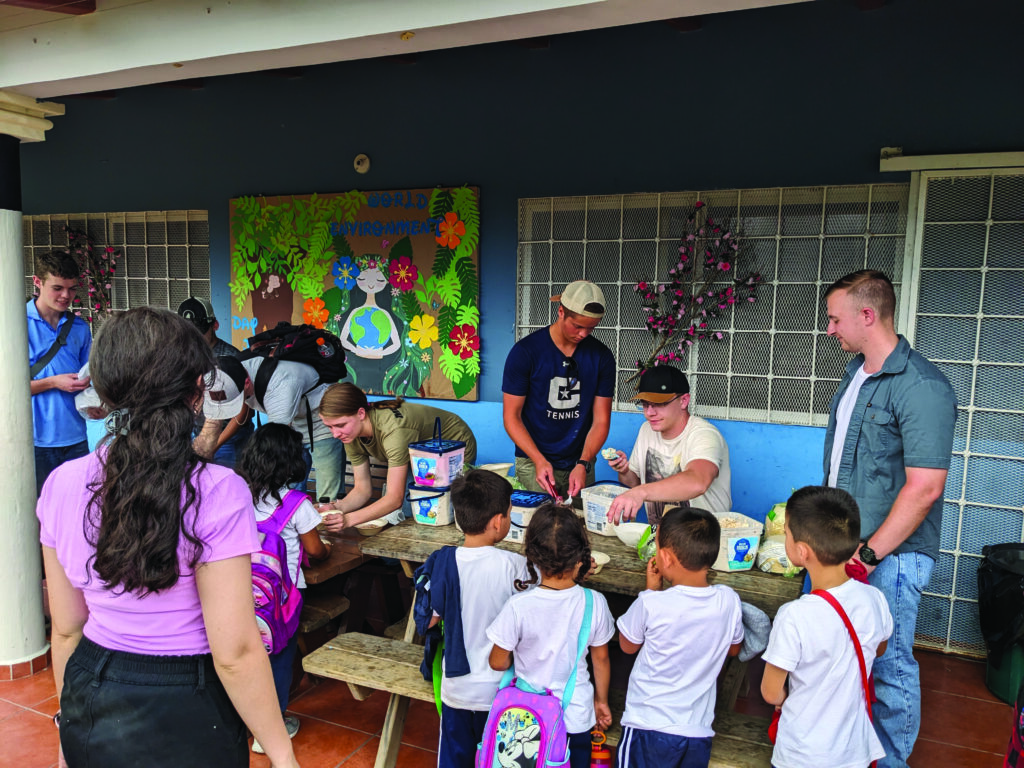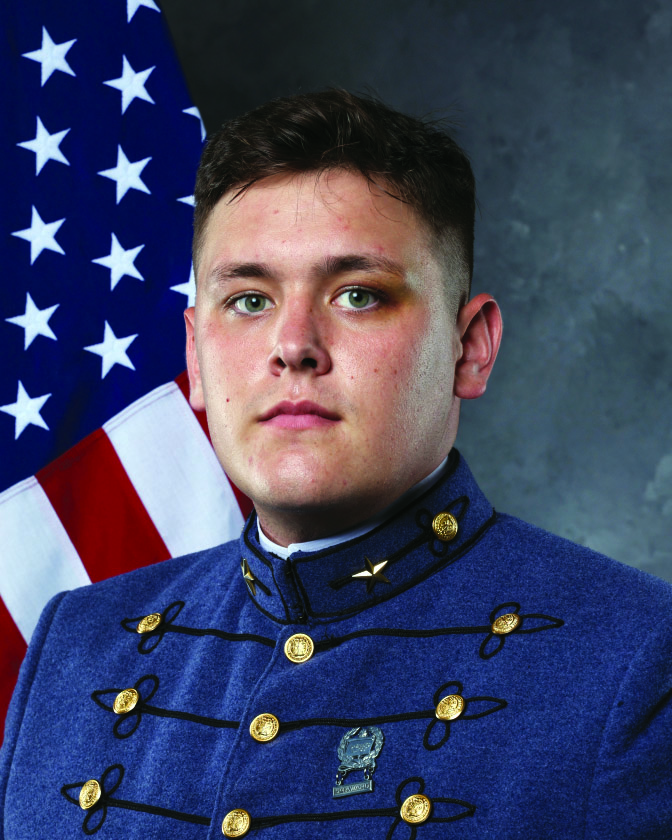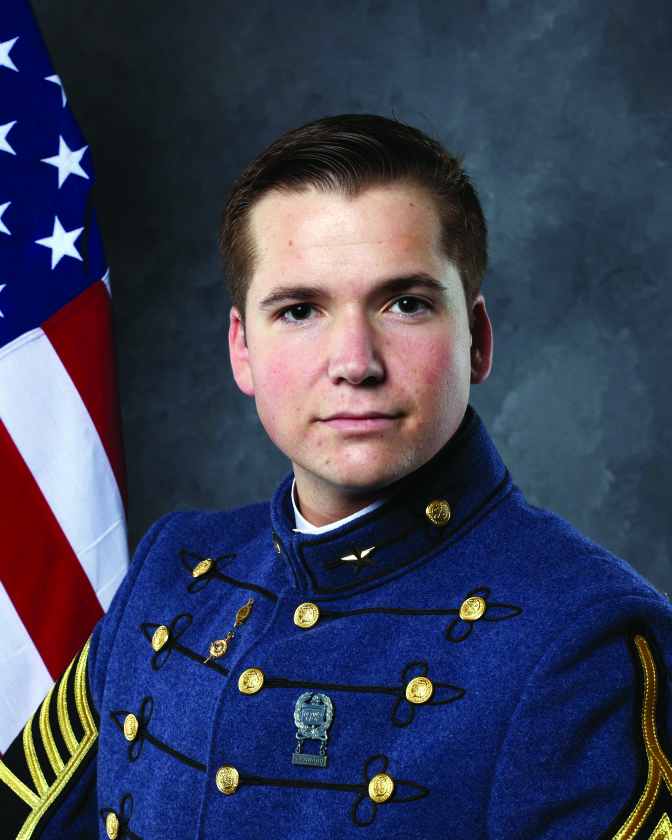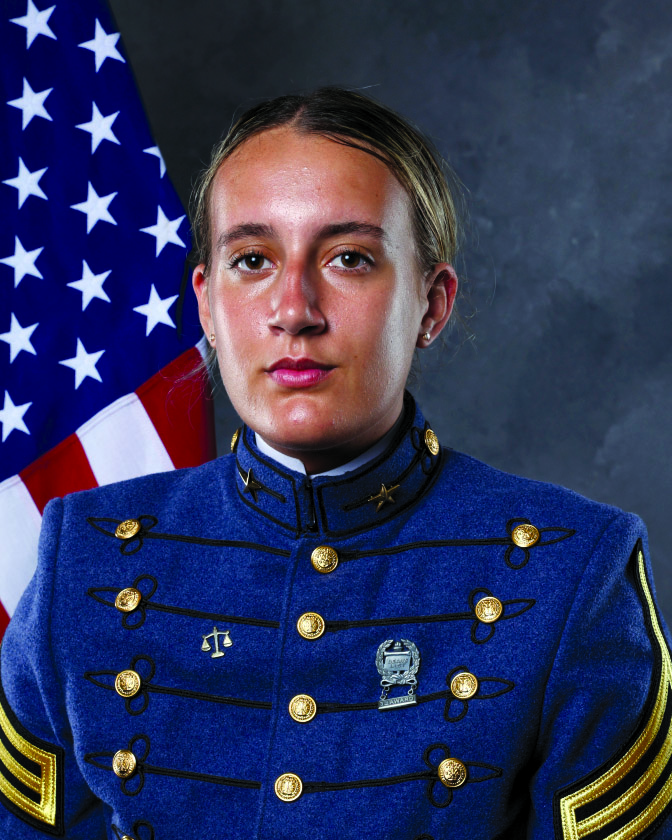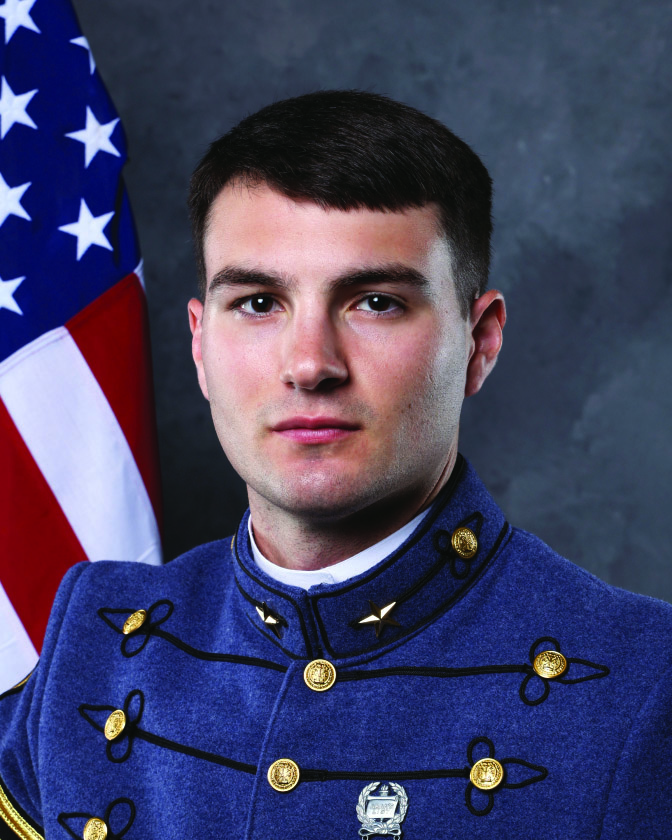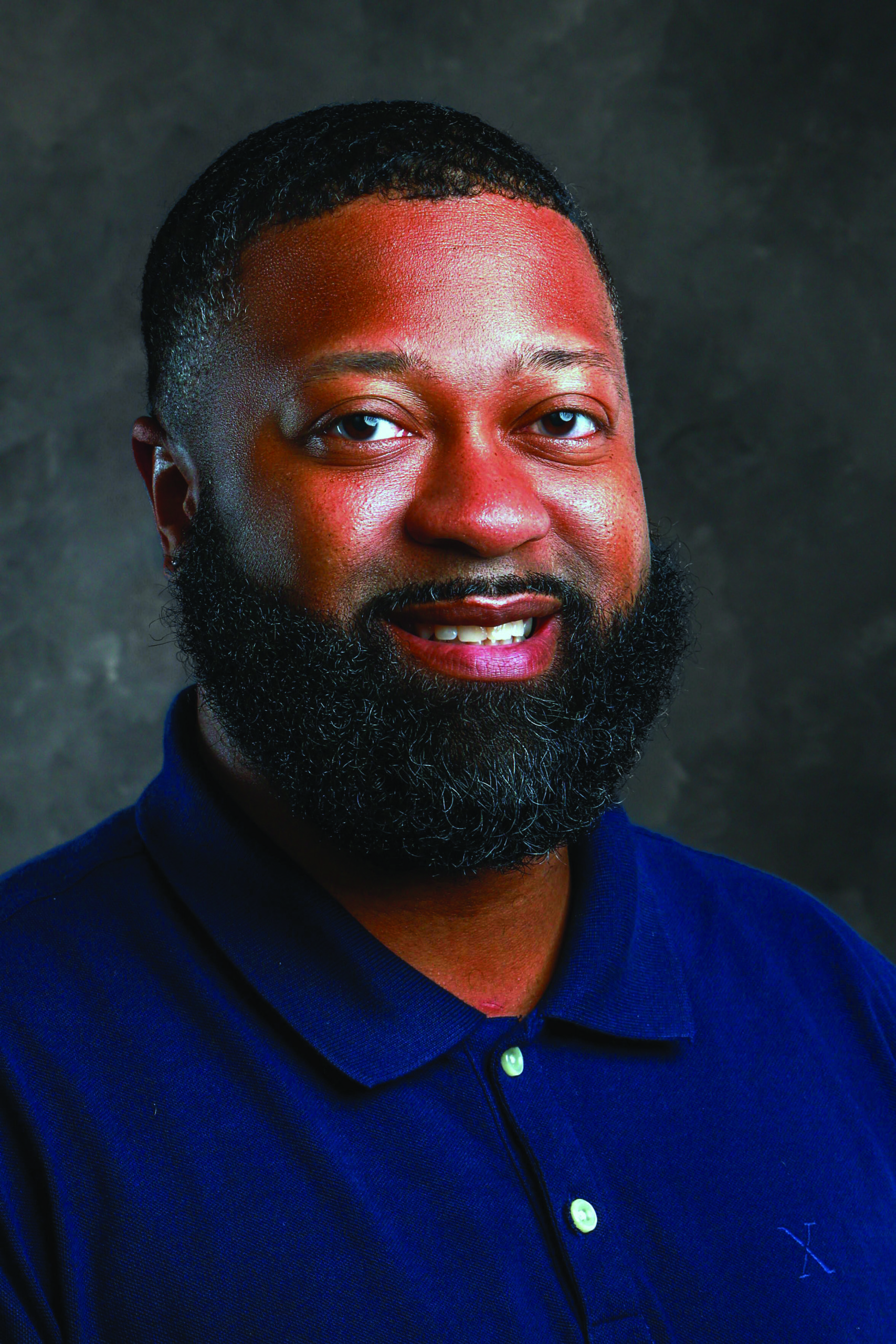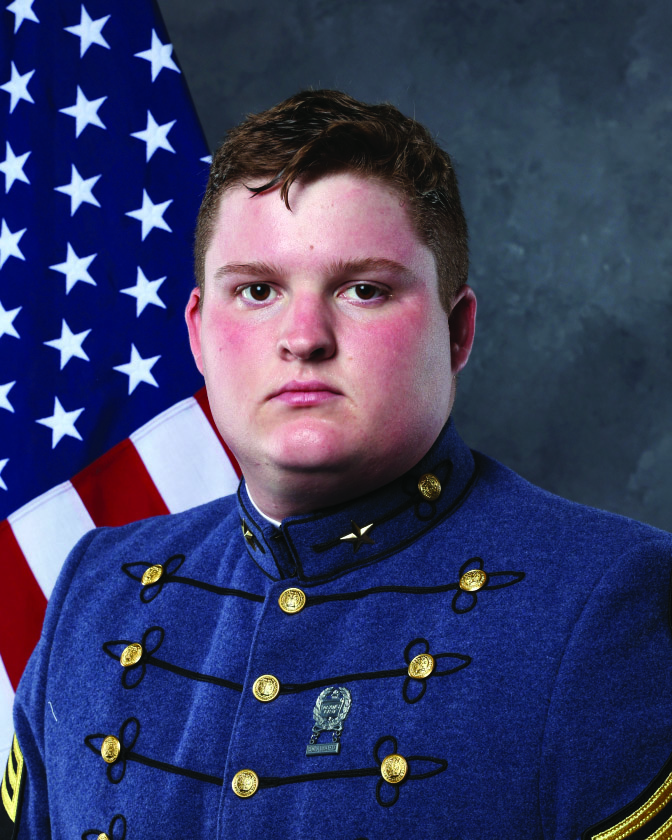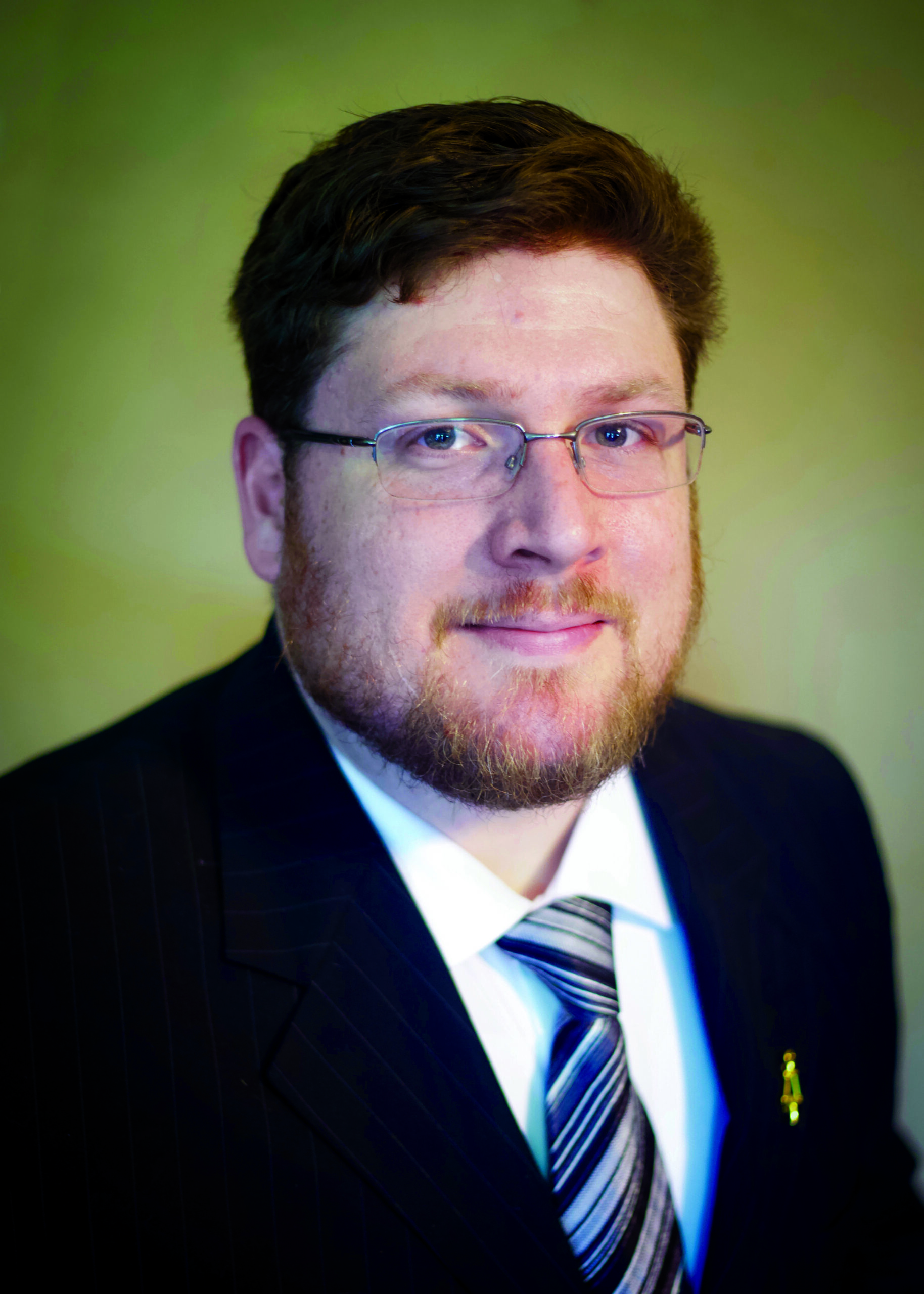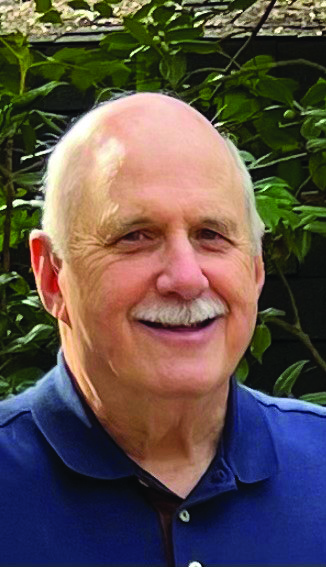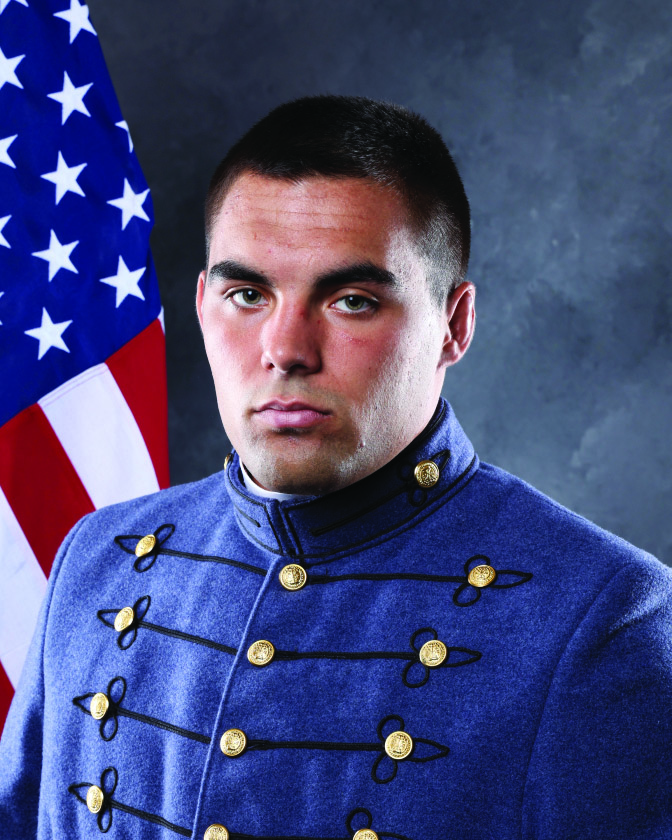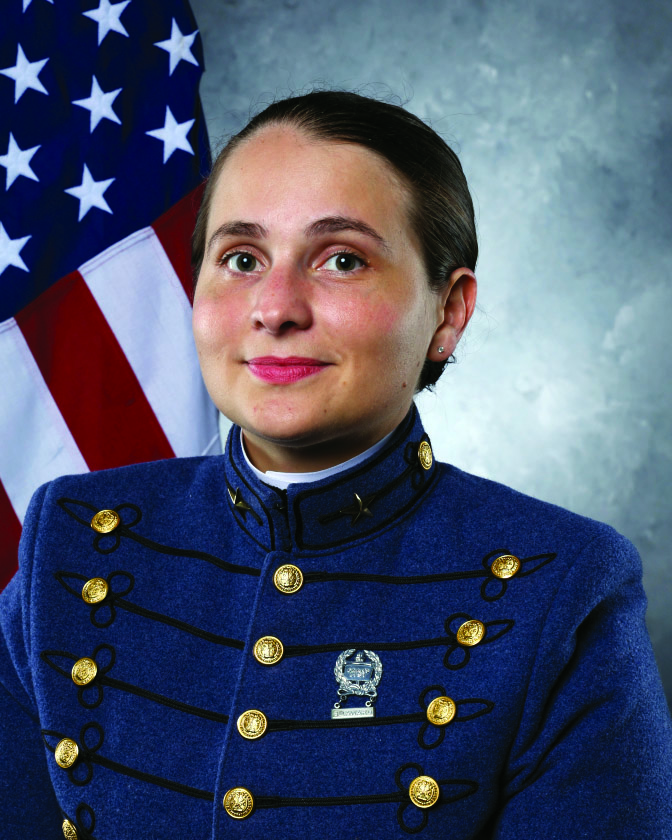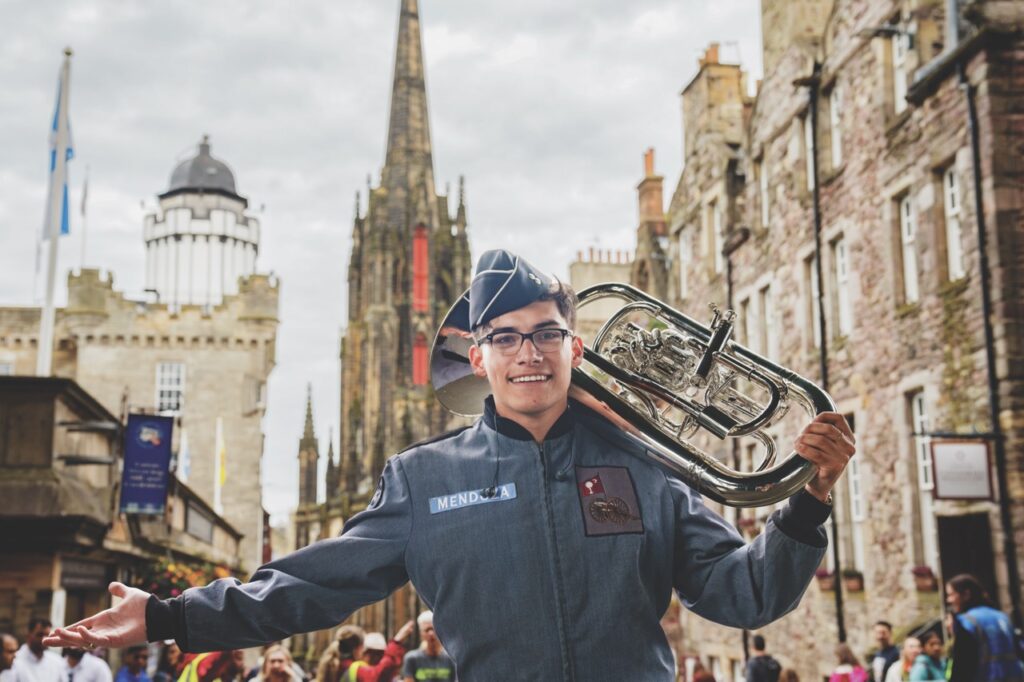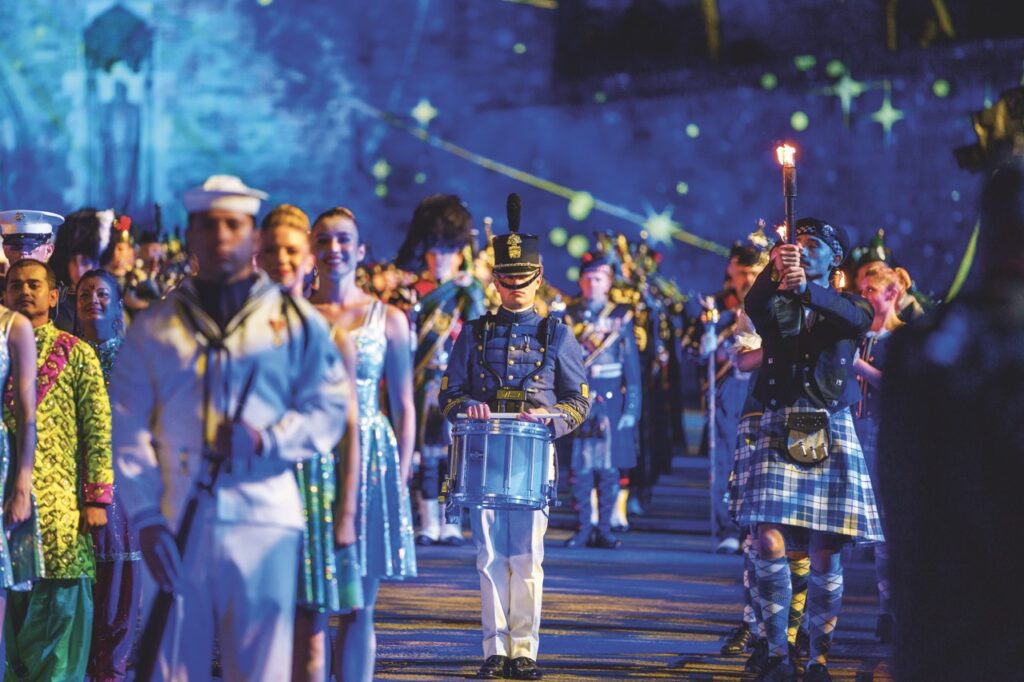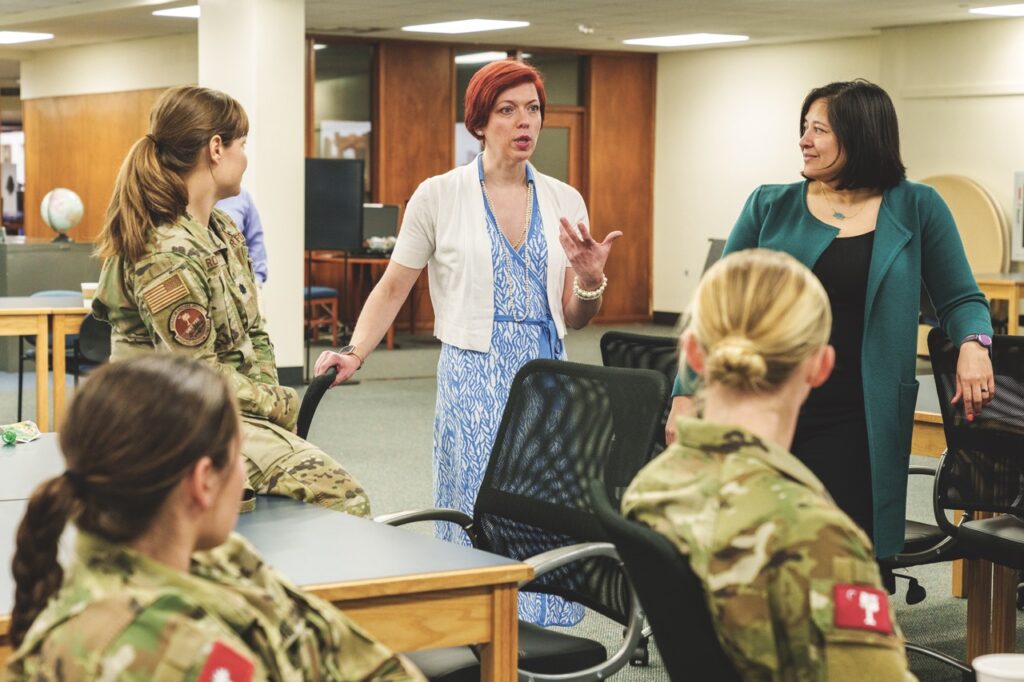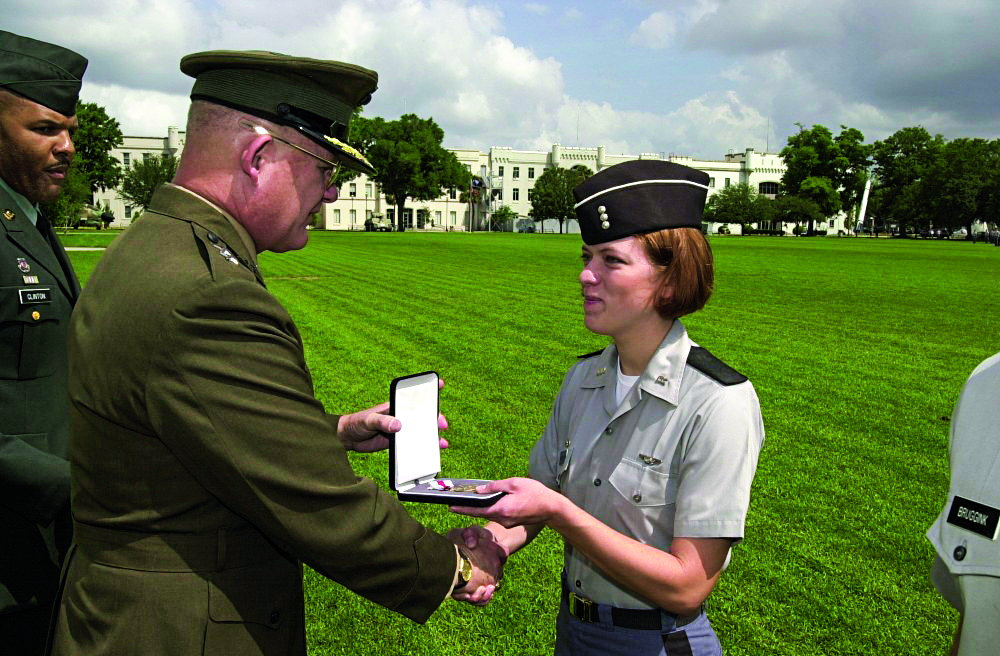Last year, nearly 1,000 cadets and students accepted their degrees during commencement ceremonies in May. While more than 30% of graduating cadets accepted commissions as officers into the armed services, many other cadets, evening and day students, veteran students, and graduate students entered the professional world ready to face any challenge. In this feature, we highlight just a few of our new graduates and the success they have found outside of Lesesne Gate. Off to great places, Citadel alumni are well on their way.
Henry Allen
Henry Allen, ’24, is marching to the beat of his own drum. The double major in political science and intelligence and security studies is now at Texas A&M, pursuing a master’s degree in international affairs at the Bush School of Government and Public Service.
As a cadet, Allen was a member of the Regimental Pipe Band, where he played bagpipes for three years before taking over as drum major. A talented musician, the Raleigh, North Carolina, native also plays the guitar, fiddle and banjo.
Allen’s experiences in the Honors Program helped prepare him for his future. “The director of the Honors Program, Dr. Deirdre Ragan, was extremely important to my career at The Citadel,” said Allen. “She encouraged me to step out of my comfort zone, which is a significant reason why I became the senior class president and a member of regimental staff.”
Evans Banks
Evans Banks, ’24, has plenty of reasons to smile—the Morrisville, North Carolina, native is attending dental school. Banks, who majored in chemistry with a focus in biochemistry, is now a student at the Medical University of South Carolina’s James B. Edwards College of Dental Medicine. “I am excited to continue my academic career at MUSC in its doctor of medical dentistry program,” said Banks. “I have been interested in a career in dentistry since high school and have worked hard to prepare for this opportunity.”
As a cadet, Banks volunteered every Thursday at North Charleston Dental Outreach, a clinic that offers dental treatment for patients whose access to dental care is restricted by their financial circumstances. “This experience taught me a lot about the dental needs of our community and has given me a new drive to one day operate or help a similar nonprofit organization as a dentist.”
Sadie Gomez
Sadie Gomez, ’24, of Covington, Louisiana, is reaching for the stars. Next May, the mathematics major will receive a second lieutenant commission in the U.S. Space Force, where she hopes to continue into space operations. “My dad really inspired me to pursue the military. He is an immigrant from the Dominican Republic and has so much love and respect for service members,” said Gomez. “I just want to make him and my family proud.”
In the meantime, Gomez is pursuing a Master of Science in Leadership degree at The Citadel Graduate College. “My Air Force ROTC cadre, specifically Capt. Alford, supported me through my time as a cadet and pushed me to become a better leader,” she said.
“My dad really inspired me to pursue the military … I just want to make him and my family proud.”
Jake Heaton
“I wanted to go to The Citadel since I was a little kid watching cadets march into football games,” said Jake Heaton, ’24, a construction engineering major and second-generation alum.
Heaton got his professional start at the cadet career fair during his sophomore year. The Aiken, South Carolina, native was hired as a project management intern at Choate Construction, one of the largest general contractors in the Southeast. “I was lucky enough to be asked to come back the following summer as a preconstruction intern,” said Heaton. “This role was beneficial as I was able to use multiple software programs in the estimating process.” Upon graduation, Heaton was hired by Choate to work as a full-time construction engineer in the Charleston office.
“I wanted to come to The Citadel since I was a little kid.”
Ronnie Jacobs
Ronnie Jacobs, CGC ’24, is securing his future. Jacobs earned his Master of Education in Counselor Education degree from The Citadel Graduate College to level up in his career.
After earning dual degrees in psychology and sociology at Charleston Southern University, Jacobs began working for the Charleston County School District as a support services coach, funded by a five-year federal grant. “I knew that I was nearing the end of the grant and wanted to do something to secure my future career in education,” said Jacobs.
Now a secondary professional school counselor with Charleston County School District, Jacobs is ready to tackle new challenges. “I am excited to be working with young people,” said Jacobs, “to help prepare them for life after high school.”
Jacobs credits Associate Professor Guy Ilagan, Ph.D., with helping to prepare him for his career advancement. “His real-world experiences mixed with his passion to guide and mold future clinicians made his classes practical, applicable and deeply meaningful.”
Hughes Milling
Civil and Environmental Engineering major Hughes Milling, ’24, plans to stay busy as an alum. The Darlington, South Carolina, native is a structural engineer at Nucor Towers & Structures, a utility company dedicated to sustainably building electrical infrastructure. Come spring, Milling intends to return to The Citadel to pursue his master’s degree in civil engineering. “I am excited to work for Nucor because I will be able to design transmission systems for new energy projects,” said Milling. “As the United States updates its electrical infrastructure, I will be able to be part of the design process.”
Milling, a third-generation Citadel legacy, credits Associate Professor Timothy Wood, Ph.D., and Associate Professor Simon Ghanat, Ph.D., with helping him on his path to becoming an engineer. “Dr. Wood’s statics class really opened my eyes into structural engineering and led me to choose it as my career field,” said Milling. “Dr. Ghanat was my academic advisor and research mentor throughout my time at The Citadel. He guided me and helped me achieve several academic goals I set for myself.”
“As the United States updates its electrical infrastructure, I will be able to be part of the design process.”
Thomas Morrison
Thomas Morrison, CGC ’24, is building toward the future. The recent graduate is an engineer in the Charleston office of EM Structural Engineers, a structural engineering design company responsible for hundreds of projects across the United States. “I was drawn to engineering because it is a technology-oriented profession geared toward problem solving,” said Morrison.
After earning his associate’s degree in engineering design graphics from Trident Technical College in 2007, Morrison decided to pursue his bachelor’s degree in civil engineering at The Citadel in the 2+2 program. “I hope to apply what I’ve learned in the preservation of historic structures.”
Houston Motz
Houston Motz, CGC ’24, is a lifelong learner. The 77-year-old secondary education major and Vietnam veteran came to The Citadel to complete an undergraduate degree he began in 1975. After serving in the U.S. Navy, Motz briefly attended Winthrop University before putting his education on hold to support his family. Despite the setback, Motz spent the years racking up graduate degrees at Winthrop, including an MBA in 1989, a master’s in liberal arts in 1996, and a master’s in history in 2010. During the COVID-19 pandemic, Motz decided it was time to finish what he started and returned to The Citadel to complete his bachelor’s degree.
Motz chose The Citadel for its values, high academic standards and veteran support. “I have always had a great admiration and appreciation for the moral compass, the core values and the leadership qualities that are taught and are at the center of The Citadel’s ethos,” said Motz. “I appreciate the support by The Citadel family for those who served.”
As an adjunct history instructor at Belmont Abbey College and York Technical College, Motz looks forward to passing his knowledge forward. “I hope to continue my part-time teaching with the new education tools given to me by The Citadel.”
Motz credits Program Coordinator and Associate Professor Christopher Dague, Ph.D., in helping him to gain those tools. “He has been a great mentor and a great source of inspiration.”
Ben Stemmet
Ben Stemmet, ’24, a finance major with a double minor in economics and data science, graduated in May ready to step into the business world. Stemmet has a three-year contract with Guggenheim Partners, a global investment and advisory firm with more than $310 billion in assets under management.
During his time at The Citadel, Stemmet, a native of Yorkville, Illinois, served as the portfolio manager for the student-managed investment fund and held several internships. A summer internship after his freshman year with a wealth management company in Mount Pleasant was followed by an internship with the venture capital firm Meeting Street Capital. During his junior year, he interned with the private equity firm Frontline Healthcare Partners, after which he interned with Bourne Partners, an investment bank based in Charlotte.
“I’ve had so many incredible opportunities from alumni connections,” said Stemmet, who was a member of the Distinguished Scholars program and a starter on the wrestling team. “They are really open to hardworking cadets, and they were more than happy to help me however they could or connect me with other alumni.”
Mary Coastal Watkins
Mary Coastal Watkins, ’24, is building bridges. A native of Goat Island, South Carolina, a sea island accessible only by boat with a fluctuating population of 35, Watkins understands the value of civil infrastructure. “I was quite literally in a boat every day of my life, rain or shine. It made me appreciate nature and different modes of transportation,” said Watkins. “I grew up fishing, catching rainwater, growing our own garden and living off the environment.”
Although the civil engineering major originally had plans to attend the United States Coast Guard Academy, The Citadel quickly became her home. “Once I met the professors and my cadet friends, I never turned back,” said Watkins. “The camaraderie at The Citadel is unmatched. All of the professors, cadets and opportunities have gotten me where I am today. The entire civil engineering department is focused on building you up for your future.”
Using her engineering education to provide vital support to a community much like her own, the recent graduate works as a field engineer in the Outer Banks of North Carolina helping to rebuild the Alligator River bridge. “I am so excited to travel to another remote island and help replace its 60-year-old bridge to the mainland,” said Watkins. “It has become expensive to maintain and costly for commuters. If it breaks, they would have to take a 99-mile detour.” Watkins, like many of her fellow alumni, is soaring to high heights and putting her Citadel education to good use.
“The camaraderie at The Citadel is unmatched. All of the professors, cadets and opportunities have gotten me where I am today.”
